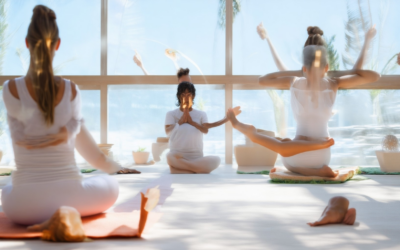“`html
In a world where anxiety often feels like an uninvited guest, finding solace and serenity may seem elusive. Yet, embracing mindfulness for anxiety can transform this inner chaos into tranquility. This article delves into powerful mindfulness strategies designed to anchor you in the present moment, offering relief and resilience. We’ll explore the 3 3 3 rule for anxiety, reveal mindfulness exercises for depression, and uncover a myriad of resources like Mindfulness for Anxiety PDFs and videos. Through guided meditation and stress management techniques, we aim to equip you with effective tools to manage anxiety, ensuring you have the insights and support you need to lead a stress-free life.
“`
The 3 3 3 Rule for Anxiety
The 333 rule for anxiety is a simple yet effective technique for managing anxiety in the moment.
- When feeling anxious, take a few seconds to look around and identify three objects in your surroundings.
- Next, listen for three distinct sounds in your environment, such as a clock ticking, a bird chirping, or a car driving by.
- Finally, move three different body parts, like wiggling your toes, stretching your arms, or tapping your feet.
This technique helps to ground you in the present moment and distract you from anxious thoughts.
By focusing on your senses and physical sensations, you can calm your mind and reduce feelings of overwhelm.
Many people find the 333 rule to be a helpful tool for managing anxiety, and it can be practiced anywhere, anytime.
For more information on anxiety management and coping strategies, visit our anxiety management page .
Additionally, check out our article on mindfulness techniques for anxiety for more ways to manage stress and anxiety.
Remember, taking care of your mental health is essential, and there are many resources available to support you.
Visit our wellness practices page for more tips and advice on maintaining a healthy lifestyle.
By prioritizing your mental health and practicing techniques like the 333 rule, you can better manage anxiety and live a happier, healthier life.
How Can Mindfulness Help Anxiety?
Mindfulness is a powerful tool that can help alleviate anxiety by teaching individuals how to stay present and focused on the current moment.
- By practicing mindfulness, individuals can learn to recognize and manage their thoughts and emotions, reducing feelings of overwhelm and anxiety.
- Mindfulness techniques, such as deep breathing and progressive muscle relaxation, can help calm the nervous system and promote relaxation.
- Regular mindfulness practice has been shown to decrease symptoms of anxiety and depression, improve sleep quality, and enhance overall mental well-being.
Benefits of Mindfulness for Anxiety
The benefits of mindfulness for anxiety are numerous and well-documented:
- Reduced symptoms of anxiety and depression
- Improved sleep quality
- Increased self-awareness and emotional regulation
- Enhanced resilience and coping skills
Getting Started with Mindfulness
If you’re interested in trying mindfulness for anxiety, here are some simple steps to get started:
- Finding a quiet and comfortable space to practice
- Setting aside a regular time each day to practice mindfulness
- Starting with short sessions (5-10 minutes) and gradually increasing duration
- Using guided recordings or apps to support your practice
Additional Resources
For more information on mindfulness and anxiety, check out these additional resources:
- Mayo Clinic: Anxiety Symptoms and Causes
- Calm: Guided Meditation and Relaxation App
- Headspace: Mindfulness and Meditation App

Beating Severe Anxiety: A Comprehensive Guide
I’ve struggled with severe anxiety for years, and I know how debilitating it can be.
- Learning about anxiety is crucial to managing it effectively.
- Mindfulness and relaxation techniques can help calm the mind and body.
- Correct breathing techniques, such as diaphragmatic breathing, can slow down heart rate and reduce anxiety symptoms.
- Dietary adjustments, like avoiding caffeine and sugar, can also help alleviate anxiety.
- Exercise, particularly yoga and walking, can release endorphins and improve mood.
- Building self-esteem through positive affirmations and self-care activities can boost confidence and resilience.
- Cognitive therapy and exposure therapy can help rewire negative thought patterns and confront fears.
- Structured problem-solving and support groups can provide a sense of community and accountability.
- Medication may be necessary for severe cases, but it’s essential to work closely with a healthcare professional to find the right treatment plan.
As someone who has experienced the challenges of anxiety, I want to emphasize the importance of seeking help and support.
There are many resources available, including online communities, support groups, and mental health professionals.
Remember, beating severe anxiety takes time, patience, and effort, but it is possible with the right tools and support.
By prioritizing self-care, seeking help when needed, and practicing effective coping mechanisms, you can learn to manage your anxiety and live a more fulfilling life.
For more information on managing anxiety, visit our anxiety management tips page.
Additionally, consider checking out our mindfulness practices for anxiety guide for more tips and techniques.
Remember to always consult with a healthcare professional before starting any new therapies or treatments.

The Best Treatment for Anxiety
Treating anxiety effectively requires a multi-faceted approach that incorporates various therapies, lifestyle modifications, and self-care practices.
-
Cognitive Behaviour Therapy (CBT)
Research consistently demonstrates that CBT is the most effective treatment for anxiety disorders, helping individuals prevent future episodes by addressing underlying thought patterns and behaviours.
CBT involves working closely with a trained therapist to identify and challenge negative thought patterns, develop coping skills, and learn relaxation techniques.
For instance, a study published on NCBI highlights the efficacy of CBT in reducing symptoms of anxiety and depression.
-
Mindfulness-Based Therapies
Mindfulness-based stress reduction (MBSR) and mindfulness-based cognitive therapy (MBCT) have gained popularity as effective treatments for anxiety.
These approaches emphasize cultivating present-moment awareness, acceptance, and non-judgmental observation of thoughts and emotions.
A study featured on Psychology Today explores the benefits of MBSR in reducing anxiety symptoms.
-
Medications and Supplements
In some cases, medications such as selective serotonin reuptake inhibitors (SSRIs) may be prescribed to alleviate anxiety symptoms.
However, it’s essential to consult with a healthcare professional before taking any medication or supplement, as they can interact with other medications or exacerbate certain conditions.
Some natural supplements like omega-3 fatty acids, ashwagandha, and GABA may also help reduce anxiety symptoms, although more research is needed to confirm their effectiveness.
-
Lifestyle Modifications
Engaging in regular exercise, practicing relaxation techniques, and maintaining a balanced diet can significantly contribute to anxiety management.
A study published on ScienceDirect highlights the positive impact of exercise on anxiety symptoms.
-
Self-Care Practices
Developing a daily routine that includes activities promoting relaxation and stress relief, such as meditation, yoga, or reading, can help mitigate anxiety symptoms.
Additionally, setting realistic goals, prioritizing tasks, and establishing a consistent sleep schedule can contribute to overall well-being.
While there is no single “best” treatment for anxiety, a combination of these approaches often yields the most effective results.
It’s crucial to work with a mental health professional to determine the most suitable treatment plan, as everyone’s experience with anxiety is unique.
By incorporating these evidence-based treatments into daily life, individuals can better manage anxiety symptoms and cultivate a more balanced, fulfilling existence.
The Number 1 Way to Relieve Anxiety
Deep breathing exercises have been widely recognized as an effective technique for reducing anxiety symptoms.
- By focusing on slow, even breaths, individuals can calm their nervous system and regain control over their emotions.
- This simple yet powerful technique can be practiced anywhere, making it an accessible tool for managing anxiety in everyday life.
- Regular deep breathing exercises can lead to improved mental clarity, reduced stress levels, and increased feelings of relaxation.
As part of a holistic approach to wellness, incorporating deep breathing into daily routines can have a profound impact on overall mental health and resilience.
Benefits of Deep Breathing Exercises
- Reduces anxiety symptoms in the moment
- Improves mental clarity and focus
- Decreases stress levels and promotes relaxation
- Increases feelings of calmness and well-being
Getting Started with Deep Breathing Exercises
To begin practicing deep breathing, find a quiet and comfortable space to sit or lie down.
- Closing your eyes, take a slow, deep breath in through your nose, filling your lungs completely.
- Hold the breath for a few seconds before exhaling slowly through your mouth.
- Repeat this process several times, focusing on the sensation of the breath moving in and out of your body.
With consistent practice, deep breathing exercises can become a valuable tool for managing anxiety and promoting overall well-being.

What Not to Do When You Have Anxiety
When dealing with anxiety, it’s essential to understand what actions can exacerbate the condition and hinder progress towards recovery.
-
Avoid Overthinking and Rumination
Ruminating on negative thoughts and worries can worsen anxiety symptoms. Engage in activities that promote mental distraction, such as exercise, hobbies, or creative pursuits.
-
Don’t Isolate Yourself
Social isolation can amplify feelings of loneliness and disconnection, which can contribute to increased anxiety levels. Reach out to friends, family, or join a support group to stay connected.
-
Steer Clear of Stimulating Substances
Caffeine, nicotine, and other stimulants can heighten anxiety symptoms. Limit or avoid these substances altogether.
-
Limit Exposure to Stressful Environments
Avoid situations or environments that trigger anxiety attacks or exacerbate symptoms. Develop coping mechanisms to manage stress in these situations.
-
Don’t Neglect Self-Care
Failing to prioritize self-care can lead to burnout and increased anxiety. Establish a routine that includes regular sleep, healthy eating, and relaxation techniques.
-
Avoid Comparing Yourself to Others
Comparing yourself to others can fuel feelings of inadequacy and low self-esteem, contributing to anxiety. Focus on your own progress and celebrate small victories.
-
Don’t Suppress Emotions
Suppressing emotions can lead to emotional buildup and increased anxiety. Practice emotional expression through journaling, talking to a therapist, or engaging in creative activities.
-
Limit Social Media Use
Excessive social media use can perpetuate unrealistic expectations and comparisons, contributing to anxiety. Set boundaries around social media use and engage in offline activities.
-
Don’t Ignore Physical Health
Neglecting physical health can exacerbate anxiety symptoms. Prioritize regular exercise, healthy eating, and adequate sleep.
-
Avoid Perfectionism
Pursuing perfection can lead to unrealistic expectations and increased anxiety. Practice self-compassion and acknowledge that imperfections are a natural part of life.
-
Don’t Rely Solely on Coping Mechanisms Conclusion
By avoiding these common pitfalls, individuals struggling with anxiety can take significant steps towards managing their symptoms and improving overall well-being. Remember to prioritize self-care, seek support when needed, and cultivate a growth mindset to navigate the challenges of anxiety.




0 Comments